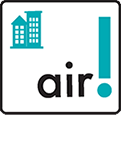Disability Law and Tobacco Control
The Fair Housing Act (FHA) prohibits a landlord from denying any person housing because of a disability. While tenants sensitive to tobacco smoke might not consider themselves disabled, chronic breathing problems or asthma can qualify as a disability under the FHA. With proof of a qualifying disability a tenant can request a reasonable accommodation from his or her landlord, and absent an undue financial burden the landlord must accommodate the disabled tenant.
Unfortunately, preventing air flow between units in a multi-unit dwelling is virtually impossible because they are built to have high air exchange rates. Studies indicate that as much as 60 percent of air circulates between units.[i] In addition, air filters cannot completely eliminate the toxic particles contained in secondhand smoke.
What is a Disability?
The FHA and Americans with Disabilities Act (ADA)[ii] define disability as:
- A physical or mental impairment which substantially limits one or more major life activities;
- A record of having such an impairment; or
- Being regarded as having such an impairment.
ADA case law establishes that breathing is a major life activity. Thus, asthma, bronchitis, and other respiratory problems may qualify as disabilities. However, in order to rise to the level of a disability, a plaintiff must show that his breathing is substantially limited by the condition. This can be a tough barrier for some plaintiffs, and any claims should be supported by medical records establishing a history of breathing difficulties.
Click here for a list of cases brought under the FHA by tenants living with secondhand smoke drift.
Take Action
If secondhand smoke is entering your apartment, there are steps you can take to protect your health.
First, keep track of each time smoke enters the apartment (noting the time, date and any resulting health problems). Also, document any occurrences where the secondhand smoke prevented the use of certain rooms or the entire apartment. Maintaining a record will strengthens a plaintiff’s case by demonstrating the frequency and severity of the smoke drift. Also, it can help establish causation between the secondhand smoke and resulting health issues.
Second, consult a physician and obtain a note documenting the disability in detail and explaining the need for accommodations. This is a key part of the process, because in order to prevail in court, a tenant must show that the landlord knew or should have known about the disability—a doctor’s note will add clarity to this legal issue. See a sample physician letter here and a sample communication record here.
Finally, gather the above records and file a request for reasonable accommodation. The Public Health Law & Policy (PHLP) website offers a helpful list of reasonable accommodations that a tenant could ask for when suffering from secondhand smoke drift. Some reasonable accommodations include asking the landlord or management agency to:
- Prohibit smoking in common areas, such as the rooftop, deck, pool, stairwell or lobby
- Prohibit smoking in all apartments in the building
- Allow you to break your lease without penalty
- Change or seal off the air ventilation system so that you no longer share a vent space with the smoker’s apartment
- Relocate to a different apartment in the building, or a different building in the complex
When requesting reasonable accommodations keep in mind that a landlord may deny any request if it creates an undue financial or administrative burden. With that said, the aforementioned accommodation requests should only cause a minimal financial burden to the landlord—for example, implementing a smoke-free policy throughout an apartment building would not present any cost to the management. Also, many states have a smoke-free housing organization or local health department that can provide helpful resources and assistance.
Courts do not set a certain dollar amount as reasonable or unreasonable, but instead consider each accommodation request on a case-by-case basis. In addition, the U.S. Department of Housing and Urban Development (HUD) provides examples of undue financial or administrative burdens on a landlord. Note that cost-sharing between a landlord and a tenant may support a finding of reasonability.
Is there a Right to Smoke?
There is no constitutional right to smoke. Proponents of smoker’s rights often argue there is a “right to smoke,” but no legal basis exists for this assertion. For instance, a smoker may assert that they have a disability that requires tobacco use (i.e. to alleviate the effects of an anxiety disorder or schizophrenia). However, disability laws require a “reasonable” accommodation, not an ideal or best possible accommodation. Therefore, if an ailment can be treated by a drug or therapy that does not generate secondhand smoke, this may negate the argument that smoking is required to treat the disability. Additionally, a landlord does not have to comply with a request for reasonable accommodation if it presents an undue hardship. The increased risk of fire and higher maintenance costs associated with smoking indoors may constitute such a hardship.
[i] David L. Bohac et al., Measured Change in Multifamily unit Air Leakage and Airflow Due to Air Sealing and Ventilation Requirements 7 (2007), view site.
[ii] The FHA regulations incorporate the ADA definition of disability. Therefore, an individual that qualifies as disabled under FHA would also qualify under ADA. 42 U.S.C. § 3602(h) (2009); 42 U.S.C. § 12102(1) (2009).
